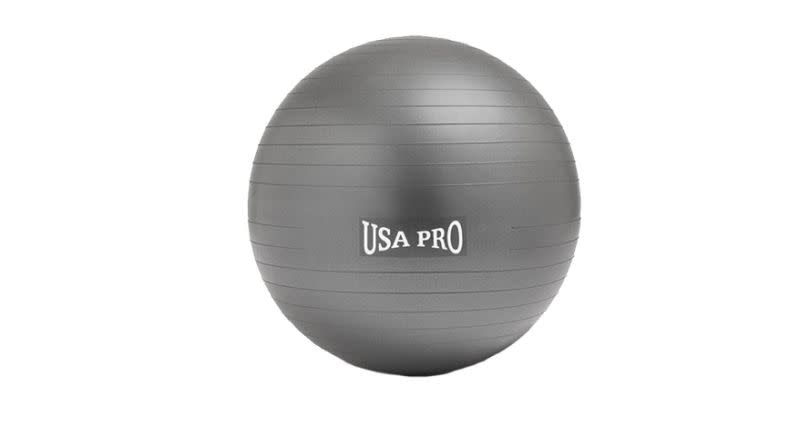Swiss balls could ward off back pain if working from home

Yahoo Lifestyle is committed to finding you the best products at the best prices. We may receive a share from purchases made via links on this page. Pricing and availability are subject to change.
UK officials have urged Britons to work from home amid the coronavirus outbreak.
While NHS staff, supermarket workers and delivery drivers are forced to venture out, millions of people across the country are setting up office in their kitchen.
Poor concentration and a lack of productivity are common complaints when WFH.
Many may not have anticipated, however, the niggling back and neck pain that comes from an unsupportive chair.
Workers missing their office seat may benefit from a more affordable Swiss ball.
The challenge of sitting on the inflated ball forces users to engage their core muscles, while aiding balance and posture.
“Sitting on a ball instead of a chair is a great way to look after your back,” according to Whittington Health NHS Trust.
“Try to sit on a ball for at least part of your work day, if you have a desk job, or even when watching television.
“When you sit on a ball, you're forced to sit up with good posture.
“Also, because the ball rolls around, it keeps your body moving, which help prevent the stiffness and back pain that you can get from being too sedentary.”
Sitting on a Swiss ball makes the core muscles “work constantly”.
“The key role of the core is to support the upper body and prevent injury to the spine,” according to Whittington Health.
“Having weaker core muscles may increase your chances of getting back pain.”
As well as warding off back discomfort, a Swiss ball may also combat the problem.
“Exercises on the ball are designed to help you move your spine in a gentle and controlled way, giving nourishment to the joints and discs that need it, by increasing the blood flow to the area,” added Whittington Health.
Swiss balls: How to choose the right one and stay safe
Swiss balls come in different sizes.
Whittington Health usually recommends asking a physiotherapist for advice, however, that may be easier said than done during the UK’s lockdown.
As a rule of thumb, your hips and knees should be parallel to the floor at a 90° angle when you sit on the ball.
Your feet should also be flat on the floor.
Measure the distance from the ground required to achieve this in a normal chair.
For safety reasons, Whittington Health recommends an “anti-burst ball”.
It also advises people maintain the natural curve of their back while sitting on a Swiss ball and place their feet further apart if needed to aid balance.
While getting used to how the ball moves, placing a soft mat underneath should provide a cushion in case you fall.
Shop an anti-burst Swiss ball
Adidas Premium Gymball | £19.99 (Was £38) from House of Fraser

This anti-burst ball can hold a maximum weight of 110kg and has a diameter of 65cm.
It’s made from anti-slip material with a weighted base so it will stay put - and also includes a hand pump so that you can easily inflate it.
USA PRO Yoga Ball | £7.99 (Was £15.99) from House of Fraser

USA Pro’s Yoga Ball comes in two sizes 55cm or 65cm, which you can chose depending on your preference and size. Both can hold a maximum weight of 300kg. The anti-burst ball also comes with a pump to inflate it.
Reebok Gym Ball | £19.99 (Was £26.99) from Sports Direct

Reebok’s design comes in three sizes: 55cm, 65cm and 75cm.
It’s weighted base aids stability and, like the others, it’s also made from anti-burst material, meaning it will slowly deflate if punctured to help avoid injury. A pump is also included.



